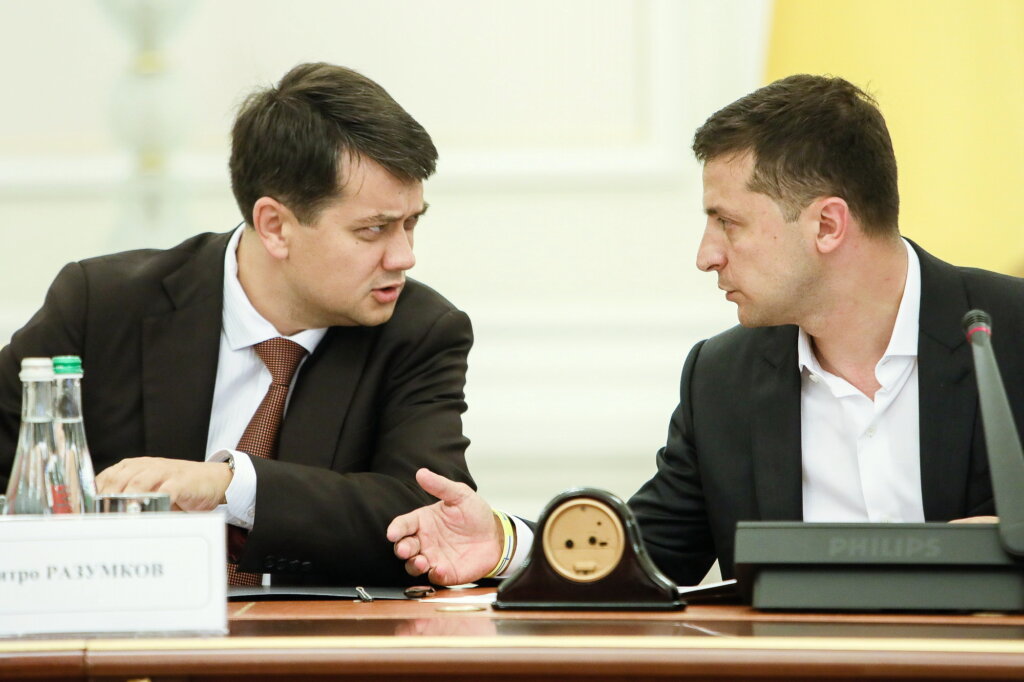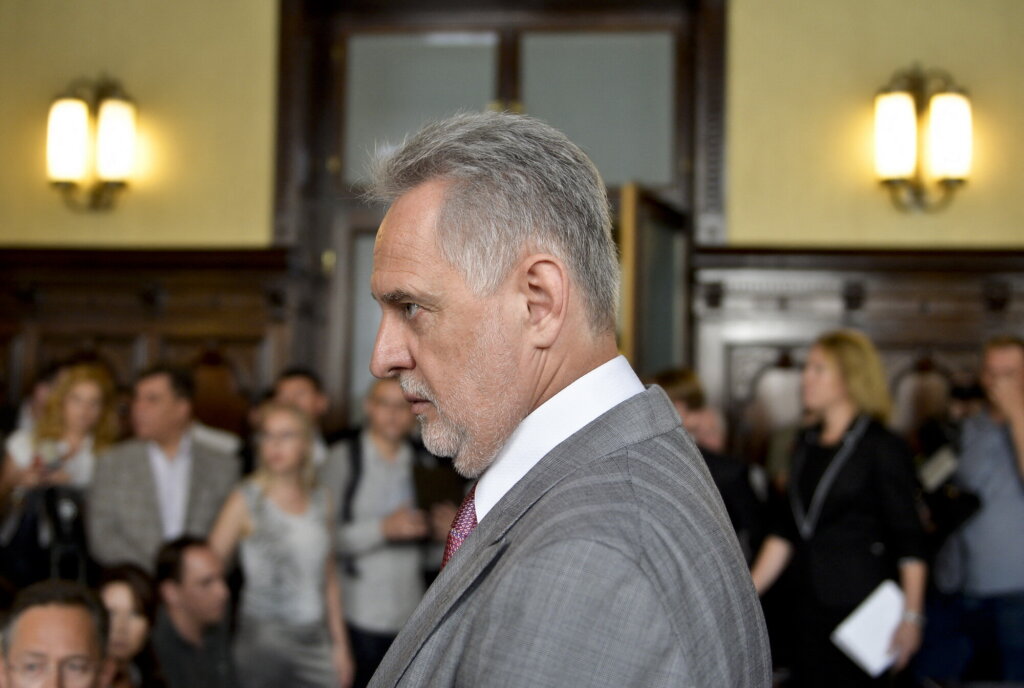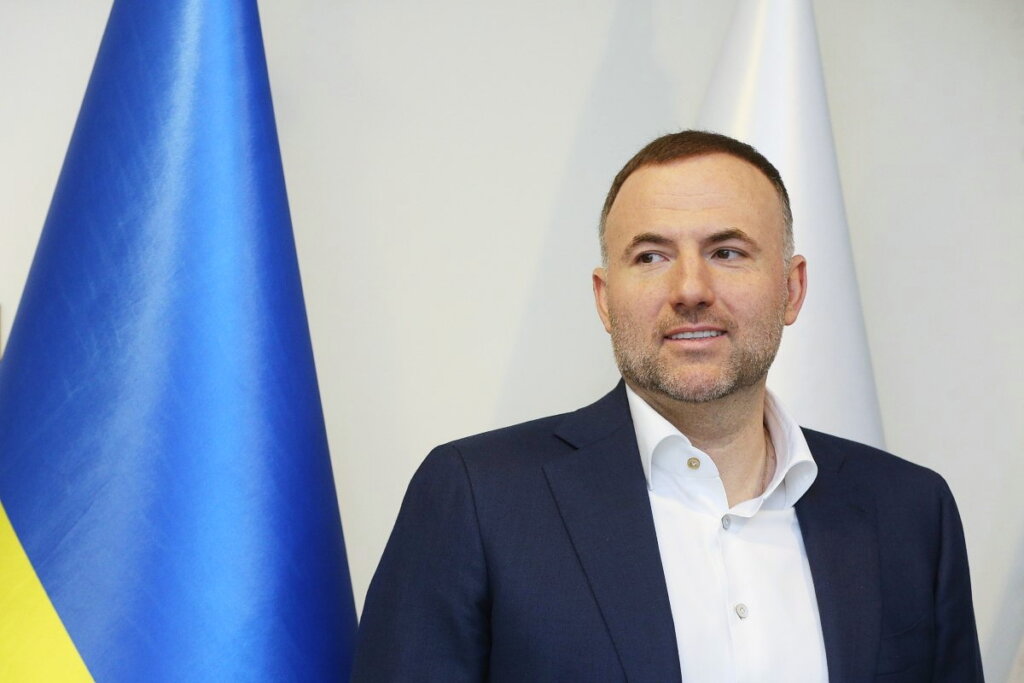The decision by the National Defense and Security Council to impose sanctions on oligarchs Dmytro Firtash and Pavel Fuks on June 18 was welcome by the public.
But there were things beyond the surface that are worth analyzing.
The deoligarchization policy is a priority for President Volodymyr Zelensky. It is designed to break the vicious circle of corruption that is damaging Ukraine’s future. His re-election hinges on success in removing the oligarchs’ privileges and impunity.
But a strange new alliance in the government stands against the deoligarchization campaign.
Razumkov revolts
Two members of the Security and Defense Council, Vekhovna Rada speaker Dmytro Razumkov and Interior Minister Arsen Avakov, didn’t support the sanctions against pro-Russian oligarchs Firtash and Fuks.
This is not the first time that Razumkov has sabotaged the issue or aligned against the president. He also didn’t vote for the council’s decision to impose sanctions on pro-Russian lawmaker Taras Kozak and TV channels controlled by Vladimir Putin’s friend Viktor Medvedchuk. Razumkov also didn’t support the radical reset of the Constitutional Court that Zelensky suggested. The head of the Rada also doesn’t want the Security Council to be responsible for the proposed “register of oligarchs.” He wants to bury the issue.

President Volodymyr Zelensky (R) talks with Speaker of Parliament Dmytro Razumkov at a meeting with the leadership of the Ukrainian parliament, the Cabinet of Ministers and law enforcement agencies on Sept. 2, 2019. (Volodymyr Petrov)
His reasoning is clear. Razumkov expects to receive support from the oligarchs in the next election. He is already a frequent guest on the TV channels of Rinat Akhmetov and former President Petro Poroshenko, where he receives warm treatment and softball questions. Considering that Firtash owns Inter TV channel, his opposition to sanctions is not surprising.
Firtash: Long overdue
When it comes to imposing sanctions on Firtash, there is only one question: Why it took so long?
Firtash has been evading U.S. criminal bribery charges in Austria for seven years, buying all the Austrian politicians around so as not to fall into the hands of American justice.

Ukrainian oligarch Dmytro Firtash reacts prior to a public hearing at the supreme court in Vienna on June 25, 2019. (AFP)
After Joe Biden’s election as U.S. president in 2020, the Atlantic Council think tank stated that “the U.S. (should) ratchet up the pressure on Austria to extradite Firtash until the request is satisfied.” In an editorial, the Washington Post wrote: “The U. S. Department of Justice can reopen cases against key Ukrainian oligarchs, including Dmytro Firtash and Igor Kolomoisky, who played an important role in blocking reforms and promoting Russian interests in Ukraine.”
Being in Austrian exile hasn’t stopped Firtash.
In Ukraine, his company sued the Constitutional Court to repeal a law that prevented him from getting back the money arrested by the National Anti-Corruption Bureau of Ukraine.
Firtash continues to control the monopoly on the production of chemical fertilizers in Ukraine, for which Ukrainian farmers sometimes pay more than the fertilizer that the oligarch sells abroad. Also under Firtash’s control is the natural gas sales network, the so-called regional gas distributors, which cover 70 percent of the market. And there are initiatives to “forgive” their debts to the state of hundreds of millions of dollars.
In the U.S., Firtash tried to be useful to Donald Trump’s lawyer Rudy Giuliani by adding a missing puzzle in his conspiracy theory against Biden. At the request of Firtash’s lawyers, Ukraine’s ex-Prosecutor General Viktor Shokin filed an affidavit in Austrian court testifying to the oligarch’s innocence and the fact that Biden — then the U.S. vice president — had demanded a case against Burisma, the company that employed his son Hunter Biden, to be closed in Ukraine. Firtash also hired Giuliani’s close allies, lawyers Victoria Toensing and Joe Digenova, although he had no success with them. Washington still demands his extradition, and he continues to spend millions to avoid it.
At the same time, Firtash established a wide range of connections among the Austrian political elite: he lives in a Viennese villa owned by Alexander Schütz, a major donor to Chancellor Sebastian Kurz’s governing Austrian People’s Party. The oligarch’s main defense lawyer is the former Austrian Minister of Justice Dieter Bomdorfer. Firtash also hired former Austrian ruling party leader Michael Spindelegger, offering him the position of head of the virtual Agency for Modernization of Ukraine.
Firtash seems to be already a burden for his Ukrainian partners Yuriy Boyko and Serhiy Lyovochkin. He is totally dependent on Russian President Vladimir Putin. He bought his chemical plants with money borrowed from Russian billionaire Arkady Rotenberg and Gazprombank, and Firtash’s bail of 125 million euros was paid by Vasily Anisimov, another Russian oligarch.
Firtash’s career in gas transportation skyrocketed some 20 years ago with the help of Russian mafia kingpins Semion Mogilevich and Sergei Mikhailov, nicknamed Mikhas.
Given this past, Firtash not only deserves sanctions from Ukraine, but also a criminal investigation by law enforcement agencies. And it is strange that Avakov, the interior minister, has done nothing in this matter and did not even vote for sanctions against Firtash.
Avakov’s game
Avakov hasn’t felt confident lately. The media writes about his possible resignation of the minister in autumn and even about a reset of the entire government in order to dump Avakov.
Avakov is the longest-serving minister in the country’s history. Appointed 7.5 years ago as an interim in the spring of 2014, he survived government reshuffles under Poroshenko and retained his seat under President Volodymyr Zelensky. Any potential for reform, if it ever existed, has long been exhausted.
Avakov is also very selective in the issue of deoligarchization. Thus, at the end of 2018, during Poroshenko’s time as president, the Security Council considered the issue of imposing sanctions on the pro-Russian TV channel NASH. But it was removed from consideration after Avakov’s speech. He said that sanctions could not be imposed on NASH if they were not imposed on Medvedchuk’s channels as well, which were then defended by Poroshenko.
As a result, NASH channel avoided sanctions, but the real reason may be quite different. For a long time, the former Party of Regions lawmaker and a close friend of the late Viktor Yanukovych Jr., Vilen Shatvoryan, was related to this channel. After Yanukovych’s escape, he found protection in Ukraine with the help of Avakov.
Pavel Fuks
As for sanctions against Avakov associate Pavel Fuks, this businessman is part of the interior minister’s vast but hidden sphere of influence.
“I have known Pavel Fuks for 25 years, since back in Kharkiv, when he was just an ordinary guy. Now we meet more often because he moved to Kyiv, he used to live in Moscow. Sometimes he calls me and we meet,” Avakov once said in a 2018 interview.
Journalists filmed Fuks’ cars coming to the Interior Ministry several times; Fuks said he was taking up a “private matter” on the visits.
The key to Avakov-Fuks’ relationship may be the history of the redistribution of former President Viktor Yanukovych’s assets. Some of them, such as gas licenses, were issued to former Minister of Energy Eduard Stavytsky, who fled to Israel, and the company Golden Derrick.

Pavel Fuks, a Ukrainian-Russian businessman who came under state sanctions by decision of the National Security and Defense Council on June 18. (UNIAN)
When Yanukovych fled, 19 of these 30 licenses were reissued to the firms believed to be controlled by Fuks. And when the National Security and Defense Council imposed sanctions against 19 of these companies in March, it was curious to see how Avakov behaved. While the meetings are closed to the public, this is how the Dzerkalo Tyzhnya newspaper described it, based on the insiders’ accounts: “Pavel Fuks’ friend, Interior Minister Arsen Avakov, asked — very carefully — some clarifying questions designed to identify the (companies’) beneficiaries. Who but Arsen Borisovich knows how business assets could be transferred in a close circle?”
And where did the other 11 out of the 30 Golden Derrick licenses go? According to Ekonomichna Pravda news site, they were allegedly registered to the companies linked to Avakov.
Namely the company called Angro Invest, linked to the aide of Ihor Kotvitsky, a former lawmaker from the People’s Front party. Kotvitsky is Avakov’s closest proxy and business associate.
The possible participation of Avakov and Fuks in the distribution of the Yanukovych-Stavytsky gas legacy could have been the reason for Avakov’s hesitation at the meeting of the Security Council that put sanctions on the companies that owned the precious gas licenses. And this is a direct conflict of interest, an additional reason for Bankova to think about whether such a minister should keep his position. Fuks has denied that he has anything to do with Golden Derrick.
Interestingly, Fuks also owns the debt of the Kyiv Subway for the train cars it bought. Fuks bought the debt from a Russian bank and Yanukovych’s associates. In 2017, the metro almost stopped, when a court froze its bank accounts.
After the death of Kharkiv Mayor Hennady Kernes in December, Fuks has been trying to present himself as the one who saved the city from the fate of Donetsk and Luhansk in 2014 — from becoming another region under Russia’s control. He now says that he acted as a mediator for another oligarch, Ihor Kolomoisky, and managed to cancel the separatist congress attended by Yanukovych.
Now Fuks wants to determine who will rule Kharkiv after Kernes. He and Avakov are betting on the current acting Mayor and Secretary of the City Council Ihor Terekhov. That’s obviously not what Zelensky’s administration wants.
Fuks and US
But Fuks has even more serious troubles in the United States. American investigative journalist Scott Stedman reported a few months ago that prosecutors in the Southern District of New York were looking into Rudy Giuliani’s ties to Ukrainian oligarchs. They questioned witnesses about their joint work and the money transferred to Giuliani from various Ukrainian sources, including Fuks. The FBI has a copy of the contract between Fuks and Giuliani, dated 2017. At the same time, Giuliani never declared Fuks as his client at the U. S. Department of Justice.
Fuks is prohibited from entry to the U. S. He got into a conflict with a lobbyist from whom he bought a ticket to Trump’s inauguration in 2017.
When the issue of sanctions against Fuks was considered at the meeting of the Security Council on June 18, for Avakov it was a moment of truth — what to choose, public interest or private? He made his clear choice: Forget the public’s interest.
So now it’s clear to Zelensky and the world that the deeply unpopular Avakov is against the president’s deoligarchization drive. This means that Avakov is simply unreliable. His replacement is only a matter of time.
